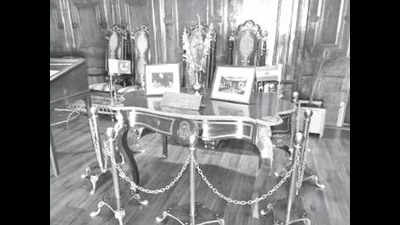- News
- City News
- shimla News
- Tale of a table and few chairs in Shimla Raj Bhavan that marked history of 1972
Trending
This story is from February 24, 2019
Tale of a table and few chairs in Shimla Raj Bhavan that marked history of 1972

The table on which then Pakistan Prime Minister Zulfikar Ali Bhutto signed the Shimla agreement.
SHIMLA: Every table tells a story, goes an adage. And inside a picturesque heritage building located in the heart of the city, a table tells you just that. A story dating back to 1972. And each time when the tension between India and Pakistan peak, many visitors to the queen of the hills are drawn towards finding out the history behind a table and few chairs at Rajbhavan.
This was the table on which Pakistan Prime Minister Zulfikar Ali Bhutto signed the Shimla agreement with the then Prime minister, Indira Gandhi marking a massive defeat to the Pakistan in the 1971 war and the creation of Bangladesh. The agreement lead to release of 93,000 Pakistani soldiers captured by the Indian army during the war.
To sign the Shimla Agreement, Bhutto had arrived in Shimla with his daughter Benazir Bhutto who was a teenager at that time. When the agreement was being signed, Rajbhawan was known the Barnes Court. It served as a government guest house and the two stayed there as state guests.
"Before their arrival, Indira Gandhi had reached Shimla and she herself had purchased curtains and sofa covers beside other items for the rooms of Barnes Court where Bhutto's had to stay. First round of talks had failed and later in the second round talks were successful and finally agreement was signed between Indira Gandhi and Bhutto at midnight," said Professor Shashikant Sharma, Advisor to Governor of Himachal Pradesh.
"This table where historic agreement was signed between India and Pakistan after which Pakistani Prisoners of War were released by India, over the years has emerged a big attraction for visitors.
It also reminds us of the bravery of Indian Army that had brought the Pakistani President all the way to Shimla to sign the agreement" he added.
Kargil war hero Brigadier (retd) Khushal Thakur said that said that Shimla Agreement was a comprehensive blue print for good neighborly relations between India and Pakistan.
He said that under the agreement it was resolved to respect for each other's territorial integrity and sovereignty besides non-interference in each other's internal affairs.
"But the way Pakistan is spreading terror in Kashmir and other parts of India shows that Pakistan does not respect the Shimla Agreement.
Pakistani politicians are issuing threats of retaliation but they should remember that we still have the table where Bhutto had discussed the release of 93,000 Prisoners of War in 1972 and had signed the agreement," he added.
Former Chief Minister and Kangra MP of BJP, Shanta Kumar said that Pakistan was created on the claim of bringing peace in the region but rather its creation has disrupted peace in the region.
He said that Pakistan has conceded defeat in all the battles it fought with India but still it is threatening India.
This was the table on which Pakistan Prime Minister Zulfikar Ali Bhutto signed the Shimla agreement with the then Prime minister, Indira Gandhi marking a massive defeat to the Pakistan in the 1971 war and the creation of Bangladesh. The agreement lead to release of 93,000 Pakistani soldiers captured by the Indian army during the war.
To sign the Shimla Agreement, Bhutto had arrived in Shimla with his daughter Benazir Bhutto who was a teenager at that time. When the agreement was being signed, Rajbhawan was known the Barnes Court. It served as a government guest house and the two stayed there as state guests.
"Before their arrival, Indira Gandhi had reached Shimla and she herself had purchased curtains and sofa covers beside other items for the rooms of Barnes Court where Bhutto's had to stay. First round of talks had failed and later in the second round talks were successful and finally agreement was signed between Indira Gandhi and Bhutto at midnight," said Professor Shashikant Sharma, Advisor to Governor of Himachal Pradesh.
He said that table on which Shimla Agreement was signed is preserved at Rajbhawan (earlier known as Barnes Court) with the original flag of Pakistan brought by Zulfikar Ali Bhutto. The chairs on which the two Prime Ministers sat for the meeting is also preserved.
"This table where historic agreement was signed between India and Pakistan after which Pakistani Prisoners of War were released by India, over the years has emerged a big attraction for visitors.
It also reminds us of the bravery of Indian Army that had brought the Pakistani President all the way to Shimla to sign the agreement" he added.
Kargil war hero Brigadier (retd) Khushal Thakur said that said that Shimla Agreement was a comprehensive blue print for good neighborly relations between India and Pakistan.
He said that under the agreement it was resolved to respect for each other's territorial integrity and sovereignty besides non-interference in each other's internal affairs.
"But the way Pakistan is spreading terror in Kashmir and other parts of India shows that Pakistan does not respect the Shimla Agreement.
Pakistani politicians are issuing threats of retaliation but they should remember that we still have the table where Bhutto had discussed the release of 93,000 Prisoners of War in 1972 and had signed the agreement," he added.
Former Chief Minister and Kangra MP of BJP, Shanta Kumar said that Pakistan was created on the claim of bringing peace in the region but rather its creation has disrupted peace in the region.
He said that Pakistan has conceded defeat in all the battles it fought with India but still it is threatening India.
End of Article
FOLLOW US ON SOCIAL MEDIA











